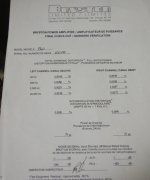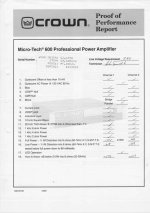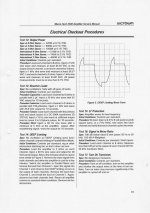Dave, correct me if I am wrong here but, I do not think there is a company that does this report card after testing "each" unit. I am not saying Bryston is the Best company but, There are not many out there that will give you all this plus quality and a 20 years warranty with it. I think for the price...you can not get wrong.
In my days in the business it was more common than not.
dave
When you say "in my days in business" Does that mean long time ago or recently?. can you name some of them that were build 100% by hand and tested before leaving factory. My friend got a Fisher from factory here in New York that was build 100% by hand but, that was in the 70's and it is still working like the first day He got it. Today sadly we do not see that anymore (except Bryston)
Last edited:
Member
Joined 2009
Paid Member
I'm a Bryston user as well. The amp is rock solid
I don't have any Bryson at the moment. At one point i had 4 4B 2 3B 2 2B. At the time i was on a 1st name basis with Chris & Russell, and had a guided tour of the factory.
Bryston is one of Canada's success stories.
dave
Yup, all my Macro- & Micro-techs...
I guess the check marks mean they are good right?
I know in the old times they used to build amps by hand but, today we do not find this thing anymore.They do it in big scale now and use just machines.
I guess today is just quantity and not quality.even cars were build like tanks lol.
My recollection of the 70's and 80's Hi-fi market was that it was dominated by technical specification and the confirmation of performance by shipping certificates, chart graph strips, even independent lab.report documents with up-market gear. This obviously became a part of the marketing strategies.
Times have changed at the high end of the market to where some customers now see technical data as anathema. At the lower end, few are even interested in more than: how loud, how cheap, how many features? Only rare curiosity would be satisfied in supplying test results for the mainstream markets now, IMHO.
Sure, with pro. microphones and pricey vinyl cartridges, this can all be worthwhile information since the vagaries of handcrafting may have been a critical factor in the manufacturing process, but even then, the electronics probably weren't affected. The specification and a pass/fail check would have been adequate on domestic equipment, at least.
Times have changed at the high end of the market to where some customers now see technical data as anathema. At the lower end, few are even interested in more than: how loud, how cheap, how many features? Only rare curiosity would be satisfied in supplying test results for the mainstream markets now, IMHO.
Sure, with pro. microphones and pricey vinyl cartridges, this can all be worthwhile information since the vagaries of handcrafting may have been a critical factor in the manufacturing process, but even then, the electronics probably weren't affected. The specification and a pass/fail check would have been adequate on domestic equipment, at least.
Last edited:
Folks:
I believe that it used to be common for high end amplifier manufacturers (or those with high end pretensions) to include operational test data with their products. I purchased an Amber Series 70 amp (long gone, Amber was a darling of budget-bound audiophiles) in 1981 or '82 and it, too, included a detailed test result sheet. I had an opportunity to visit Amber's plant in Charlottesville, Virginia a few years later, and the guys there were very excited to have a customer visit them -- they really wanted to develop a bond or connection with their supporters. I suspect that including test result sheets with amplifiers is another way for manufacturers to do exactly that.
Regards,
Scott
I believe that it used to be common for high end amplifier manufacturers (or those with high end pretensions) to include operational test data with their products. I purchased an Amber Series 70 amp (long gone, Amber was a darling of budget-bound audiophiles) in 1981 or '82 and it, too, included a detailed test result sheet. I had an opportunity to visit Amber's plant in Charlottesville, Virginia a few years later, and the guys there were very excited to have a customer visit them -- they really wanted to develop a bond or connection with their supporters. I suspect that including test result sheets with amplifiers is another way for manufacturers to do exactly that.
Regards,
Scott
It's just a good feeling to know that someone has verified the performance of the product and signed it off. It's posible that the new amps that come with no documentation can do all the same things but the piece of paper gives one peace of mind and the feeling that the manufacturer may care a little more about their product.
Another example is the 20 or so "electrical checkout procedures" in the macrotech service manuals. When the technician has finished any work on the amplifier he should perform the tests in order and verify the amplifier performance.
They range from the usual dc offset and bias setup to my favourite - "Test 13, Reactive Load - Procedure Torture & Procedure Short"
It's good to know someone has tried these things...
Another example is the 20 or so "electrical checkout procedures" in the macrotech service manuals. When the technician has finished any work on the amplifier he should perform the tests in order and verify the amplifier performance.
They range from the usual dc offset and bias setup to my favourite - "Test 13, Reactive Load - Procedure Torture & Procedure Short"
It's good to know someone has tried these things...
Attachments
On the Bryston subject:
A tech friend of mine got a couple of old Brystons in to repair for a studio. Bryston still made the "send them in to us and we'll fix 'em up and return them as new" offer. Since it wasn't worth the shipping costs, they then volunteered any help they could give and sent all the required parts no charge.
You've got to respect that sort of commitment to service.
A tech friend of mine got a couple of old Brystons in to repair for a studio. Bryston still made the "send them in to us and we'll fix 'em up and return them as new" offer. Since it wasn't worth the shipping costs, they then volunteered any help they could give and sent all the required parts no charge.
You've got to respect that sort of commitment to service.
Hello
There is some brands who still build amps by hand, like First Watts made by Nelson Pass, Aspen amps made by Hugh Dean, etc, but those are made in a small scale.
Bye
Gaetan
Small companies that cannot afford machines build by hand, there is no other way unfortunately, but machines do it as high speed and consistent high quality, people don't.
We have to place a test station after a hand has touched equipment to make sure the hand did not **** it up, soldered badly, placed a wrong components or up-side down, etc, etc.
Other nice things about machines, they don't take leave, go off sick, get lazy, come to work intoxicated, go to the toilet, take a smoke breaks, make mistakes, steal stuff, argue, want a pay rise, go on strike, sabotage the company, I can go on forever. Hands just don't beat machines ever.
Since we went from hand assembly to machine assembly our fist time pass rate went up three orders of magnitude and our failure rate and warranty returns became minuscule compared to when we hand built everything. Warranty provisions have diminished to 0.002% of turn-over, it was orders higher before switching to machines.
Unless a component is faulty (which is highly unlikely these days buying from original manufacturers) the product is consistent in every way, giving a little certificate becomes a marketing ploy. If I did not get a certificate of final testing from a hand built company I would be very suspicious, you will never know if it is any good.
Giving long warranties is noting out of the ordinary, you make warranty allowances in the price of a product, this is another marketing ploy as well as add unnecessary cost.
Take an example of a stand-by power converter. a satellite TV decoder, a cellular phone, a watch, etc. it runs 24/365 for at the very least 4 years (mostly much more) this is roughly 400 000 hours. Take your brand name certificated hand built amplifier, you turn it on for maybe 4 hours a day, it should last for 274 years, not 20 years under these conditions.
You really need a crummy product, cheap counterfeit components, badly designed to receive warranty claims that exceeds your profit margin, these companies do not exist for long and you won't buy the same brand ever again again.
One gets the impression that some manufacturers care about their product. Somewhat different to the the modern "profit at all cost" philosophy.
Hi Andrew, there is not a company or product that can exist without making a profit. If there is no profit to be made, then it is a welfare organisation funded by the state.
The question of cost lies in demand. If there is no demand it will cost a fortune. High end audio adds a few mechanical trivialities to try and justify the cost, but it is really the low demand that drives the cost up. I 20mm aluminium face plate does nothing for the sound, but the saying is, it cost so much it might as well look nice.
If a guy needs to pay all his bills from the single amp he makes every month on his kitchen table or back room, be sure to pay a lot of money for it. If this guy lives in the back streets of India, the same amp will cost a lot less than if he lived in Hollywood or London where the cost of living is higher.
Last edited:
- Status
- This old topic is closed. If you want to reopen this topic, contact a moderator using the "Report Post" button.
- Home
- Amplifiers
- Solid State
- I like this detail!


